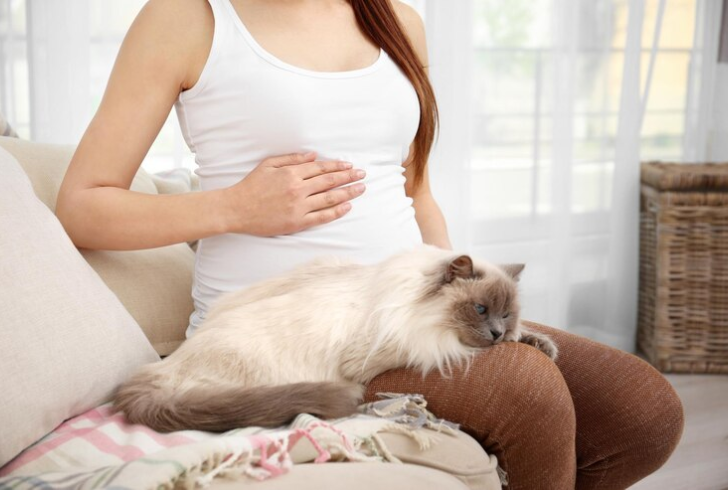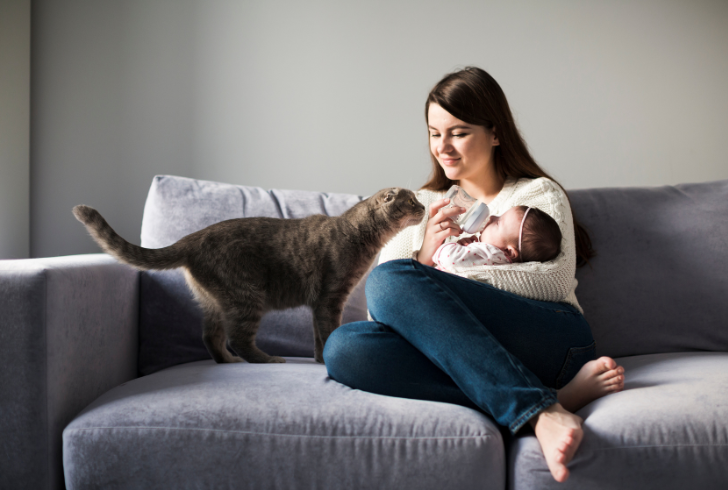Can Your Cat Really Sense Your Pregnancy?
Pregnancy changes a lot—your mood, your appetite, your sleep, and, surprisingly, your cat’s behavior. If you’ve noticed your feline friend acting extra affectionate (or suddenly distant), you’re not alone.
Plenty of cat owners report subtle changes in their pet’s behavior even before a pregnancy test turns positive. But is your cat really picking up on your pregnancy, or are we reading too much into it?
Let’s break it down with insights from veterinarians and medical experts.
Do Cats Know When You’re Pregnant?
There’s no scientific proof that cats know you’re pregnant like humans do, but experts believe they’re reacting to physical and behavioral changes in their owners.
Dr. Mikel Delgado, a cat behavior specialist with Rover, explains, “Cats are incredibly sensitive to changes in their environment. While they may not understand you’re pregnant, they often notice your scent or behavior has shifted.”
Cats have a superior sense of smell. Hormonal fluctuations during pregnancy, like elevated estrogen or progesterone, can subtly alter your body’s scent. Add that to your new routines, emotional shifts, or reduced energy, and your cat’s bound to pick up on something.
OB-GYN Dr. Eboni January agrees. “There aren’t clinical studies confirming cats detect pregnancy, but they absolutely notice the small, physical changes. A cat might not know what’s happening, but it knows something’s different,” she shares.
Signs Your Cat May Notice Pregnancy Changes

Freepik | pixel-shot.comon | Pregnancy can cause your cat to become notably more affectionate and clingy.
Whether your cat is glued to your side or giving you the cold shoulder, it could be reacting to your pregnancy in its own way. Some common shifts include:
1. Being extra affectionate and clingy
2. Following you from room to room
3. Sleeping closer to your belly
4. Acting protective or overly alert
5. Withdrawing or seeming more distant if it senses stress
Veterinary surgeon Dr. Aimee Warner explains that these changes are likely driven by a cat’s acute sensitivity to scent and routine. “Cats aren’t mind readers, but they’re sharp observers. Some will stay close for comfort, others may distance themselves from overwhelming energy,” she notes.
Some owners have even noticed their cat behaving differently before they knew they were pregnant. While this hasn’t been proven by science, it’s likely tied to the cat’s instinctual response to altered hormones and body chemistry.
Why Cats May Get Extra Clingy
Don’t be surprised if your cat turns into a little shadow. During pregnancy, your body temperature naturally rises. That warmth makes you an irresistible heat source. Dr. January says, “Cats love cozy spots. Pregnant people radiate more body heat, so cuddling becomes even more appealing to them.”
But it’s not just warmth they’re drawn to. Emotional energy and routine changes play a big role too. “Cats are very attuned to body language and emotional shifts. If they sense something’s off—or if you’re just more tired—they may stay close for comfort,” says Dr. Warner.
Safety Tips for Pregnant Cat Owners
Most cats aren’t a danger during pregnancy, but litter boxes can be. The concern? A parasite called Toxoplasma gondii found in some cat feces. If contracted, it can lead to serious complications for the baby.
Here’s how to stay safe:
1. Let someone else clean the litter box if possible
2. If you must do it, wear gloves and wash your hands thoroughly afterward
3. Clean the box daily—this reduces the chance of parasite development
4. Keep cats indoors to prevent them from catching infected prey
5. Avoid feeding your cat raw meat
6. Don’t bring home new cats or stray kittens during pregnancy
7. Wash hands after petting, especially before meals
Helping Your Cat Adjust to the Baby

Freepik | To deter feelings of neglect in your cat, prioritize affection and routine.
A new baby can rock your cat’s world. The goal is to make this transition smooth without causing anxiety for your pet.
Before the baby arrives:
Start adjusting your daily routine to reflect what life will be like after the baby comes. Allow your cat to explore the nursery and baby items to lessen its anxiety about new surroundings. Playing soft recordings of baby sounds can help your cat gradually get used to unfamiliar noises.
After the baby is home:
When the baby arrives, let your cat watch from a distance without forcing contact. Introducing a blanket or clothing item that the baby has used helps the cat become familiar with the new scent.
Keep showing your cat affection and maintain their regular routine to avoid feelings of neglect. Always supervise the first interactions between your cat and baby to ensure safety and comfort for both.
Your Cat Might Know More Than You Think
While cats may not grasp the concept of pregnancy like humans do, their reactions often suggest they sense something is shifting. From curling up on your growing belly to watching you a little more closely than usual, your cat may be picking up on physical changes, hormonal shifts, and emotional cues without any words being spoken.
By staying aware of their behavior, practicing safe habits, and helping them ease into the changes ahead, your cat can be a calm, comforting presence during this big life transition — and even a curious companion when your baby arrives.